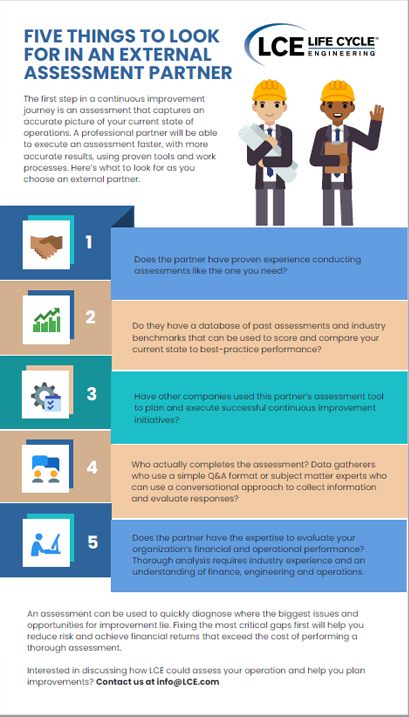What should you look for in an effective assessment partner?
By Rick Wheeler, Executive Director, Life Cycle Engineering
When organizations reach out to Life Cycle Engineering for help what they most often need is to boost operating and financial performance by improving the reliability of their people, processes and assets. In almost every case, the first step we recommend is to perform an assessment. Why is that?
Why do organizations do assessments?
Organizations consider doing assessments when they want to capture an accurate picture of their current state of operations or baseline performance. It may be planned as the first step in planning for a continuous improvement journey or a specific improvement initiative, or to diagnose the cause of problems that are impacting performance. Another impetus for doing an assessment is to provide benchmark information on how their performance compares to other companies in their industry.
What are the benefits of performing assessments?
An accurate picture of your current state is clearly important to any effort to improve performance. The picture of your current state becomes valuable when you compare it to benchmark performance and best practice. And an assessment will identify the financial value of closing the gaps between how you’re currently operating and how you could be operating.
Understanding the gaps between your current state and best practice is the starting point for planning a realistic and safe journey to achieving the results of applying best practices. You want to plan the route to get you there most quickly (without taking unnecessary risk) and an assessment from a knowledgeable, unbiased partner will help you not only identify the most significant gaps, but also should help you pinpoint which areas you should target to improve your performance as quickly as possible.
What to look for in an external partner
In most cases a professional partner will be able to execute the assessment faster with more accurate results using proven tools and work processes. A partner will also have access to benchmark data that will clearly identify your current performance compared to your industry peers. This can be used to quickly diagnose where the biggest issues and opportunities for improvement lie. Fixing the most critical gaps first will help you reduce risk and achieve financial returns that exceed the cost of performing a thorough assessment.
What should you look for in an effective assessment partner? Here are some factors to consider:
- Does the partner have proven experience conducting assessments like the one you need?
- Do they have a database of past assessments and industry benchmarks that can be used to score and compare your current state to best-practice performance?
- Have other companies used this partner’s assessment tool to plan and execute successful continuous improvement initiatives?
- Who actually completes the assessment? Are they data gatherers who use a simple question and answer format or do they use subject matter experts who can use a conversational approach to collect information and evaluate responses? Do they have experienced practitioners that can use field observations to validate what’s captured in conversations?
- Does the partner have the financial expertise to evaluate your organization’s financial and operational performance? A thorough analysis requires industry experience and an understanding of finance, engineering and operations. This analysis helps to pinpoint the value of improving performance and will help you build the business case for change as well as prove how you can quickly recoup the cost of performing the assessment.
Conclusion
Assessments are an indispensable part of planning a continuous improvement journey. Every journey is a little different and therefore your assessment requirements are going to depend on your organization’s strategy, goals and objectives. As you plan for doing an assessment, invest the time in thinking through your goals, your scope, and who will perform the assessment. Think through how you’ll use the assessment results to drive stronger performance and financial results. And be ready to learn an immense amount about where you are, where you want to go, and how to get there.
Interested in discussing how LCE could assess your operation and help you plan improvements? Contact us at info@LCE.com

